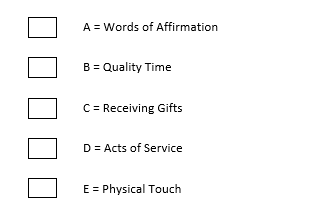Improving Relationships

Over the past century, the nature and purpose of marriage and relationships has changed significantly. Where finding and staying with a partner was previously focused on safety, security and having children, adults today increasingly want more from their relationships. They see choosing and having a partner as a kind of self-expression, and view relationships as responsible for personal growth, self-esteem and autonomy. Interestingly, while we are asking more of our relationships than in the past, we are investing less time and resources into them than ever before.

Just like a new car needs regular servicing to keep it in good shape, your relationship needs regular attention, check-ups and tuning.
The Biology of Love
Oxytocin is a powerful hormone that strengthens the bond between two humans. It is produced by a mother when she breastfeeds and by both men and women when they orgasm. In smaller amounts, it is also produced when couples touch one another, cuddle, laugh together or look into one another’s eyes. As well as strengthening the connection between two people, higher levels of oxytocin have been shown to increase empathy and generosity – important qualities in a healthy relationship.
Ways to increase oxytocin:
- Holding hands;
- Looking into your partner eyes;

- Hugging;
- Kissing;
- Having sex;
- Massage;
- Laughter; and
- Giving to charity or volunteering together.
When a relationship begins to breakdown, these are the things that often decrease. Consider how close you and your partner are in physical terms. Have you lost your ‘closeness’? Think about what brought you together in the first place and see if there is an opportunity to become more tactile. Also, plan events together; get a babysitter (if required) and have a regular date night; take a walk and talk. The aim is to bring back some of the things you did when you were first together.
Communication
Every couple argues – this is normal! It is how we argue, and most importantly, how a couple comes together after a disagreement that builds the foundations for a successful relationship. John Gottman, an expert in relationship psychology, outlines four key types of behaviours. They are:
- Criticising your partner, rather than listening to them;
- Responding to your partner with sarcasm or cynicism (also known as contempt);
- Reacting defensively to things your partner is trying to tell you; and
- Disengaging from the conversation and ‘switching off’ (also known as stonewalling).
Effective communication is a skill and takes quite some practice. The main trick is to try and remain neutral and listen to each other (even when your partner is pushing your buttons or vice versa). If you find yourself using the behaviours identified above - stop - take a break and try and re-engage more positively.

Improving Relationships Action Plan (1)
Empathy building activity
A good way to develop your empathy skills is by practice. Too often we get so caught up in arguing about an issue, that we forget how this problem or behaviour may be making our partner feel. Disagreements often get stuck when we become caught up in the specific details of an argument (e.g. “I didn’t say ---------), these arguments go around in circles and are rarely solved without one person admitting they are wrong and the other person is right.
Part 1
In the sentence structure below, it is important to make a connection between a behaviour or problem and how it makes you feel. It is easier to empathise with your partner if you can identify with having a particular emotion – most people know what it is like to feel embarrassed, or sad.
Once you have made this connection, briefly explain why, before asking them to do something different next time. Remember to make sure your suggested solution is something they are capable of doing and is reasonable.
I feel _______, when you __________, because ___________. In future, can you please ________.
(emotion) (behaviour) (explanation) (solution)
For example:
I feel belittled when you talk over me at dinner parties, because it seems like what I have to say is not important. In future, can you please wait for me to finish before you speak.
Part 2
Now comes the hard part. The person listening, must try to mirror the above statement as accurately as possible before responding or saying anything else. This is key to making sure that they have listened, and they have understood.
Good example:
Ok, so you’re saying that when I talk over you at parties you feel belittled or unimportant?
Acceptable, but not great example:
You feel annoyed that I talk too much when we go out?
The second example, while somewhat reflective, does not accurately mirror what the first person said. It misses the specific behaviour (talking over them, not how much they talk) and the resulting feeling (unimportant or belittled, not frustrated). Have another go until you are able to understand where the other person is coming from.
Remember, this won’t necessarily solve your arguments, but it will help you develop the skill of empathy – putting yourself in your partner’s shoes.
Improving Relationships Action Plan (2)
Love Languages
One of the most common difficulties is relationships is communication, and not always what you are communicating to your partner but how. Have both you and your partner take the following quiz to learn more about how you like affection and love to be communicated to you, and identify your Love Languages.
|
I like to receive notes of affirmation.
I like to be hugged.
|
A
E
|
I like to be touched as friends and loved ones walk by.
I like it when people listen to me and show genuine interest in what I am saying
|
E
B
|
|
I like to spend one-to-one time with a person who is special to me.
I feel loved when someone gives practical help to me.
|
B
D
|
I feel loved when friends and loved ones help me with jobs or projects.
I really enjoy receiving gifts from friends and loved ones.
|
D
C
|
|
I like it when people give me gifts.
I like leisurely visits with friends and loved ones.
|
C
B
|
I like for people to compliment my appearance.
I feel loved when people take time to understand my feelings.
|
A
B
|
|
I feel loved when people do things to help me.
I feel loved when people touch me.
|
D
E
|
I feel secure when a special person is touching me.
Acts of service make me feel loved.
|
E
D
|
|
I feel loved when someone I love or admire puts his or her arm around me.
I feel loved when I receive a gift from someone I love or admire.
|
E
C
|
I appreciate the many things that special people do for me.
I like receiving gifts that special people make for me.
|
D
C
|
|
I like to go places with friends and loved ones.
I like to high-five or hold hands with people who are special to me.
|
B
E
|
I really enjoy the feeling I get when someone gives me undivided attention.
I really enjoy the felling I get when someone helps me make decisions.
|
B
D
|
|
Visible symbols of love (gifts) are very important to me.
I feel loved when people affirm me.
|
C
E
|
I feel loved when a person celebrated my birthday with a gift.
I feel loved when a person celebrates my birthday with meaningful words.
|
C
A
|
|
I like to sit close to people whom I enjoy being around.
I like for people to tell me I am beautiful/handsome.
|
E
A
|
I know a person is thinking of me when he or she gives me a gift.
I feel loved when a person helps with my chores.
|
C
D
|
|
I like to spend time with friends and loved ones.
I like to receive little gifts from friends and loved ones.
|
B
C
|
I appreciate it when someone listens patiently and doesn’t interrupt me.
I appreciate it when someone remembers special days with a gift.
|
B
C
|
|
Words of acceptance are important to me.
I know someone loves me when he or she helps me.
|
A
D
|
I like knowing loved ones are concerned enough to help with my daily tasks.
I enjoy extended trips with someone who is special to me.
|
D
B
|
|
I like being together and doing things with friends and loved ones.
I like it when kind words are spoken to me.
|
B
A
|
I enjoy kissing or being kissed by people with whom I am close.
I enjoy receiving a gift given for no special reason.
|
E
C
|
|
What someone does affects me more than what he or she says.
Hugs make me feel connected and valued.
|
D
E
|
I like to be told that I am appreciated.
I like for a person to look at me when we are talking.
|
A
B
|
|
I value praise and try to avoid criticism.
Several small gifts mean more to me than one large gift.
|
A
C
|
Gifts from a friend or loved one are always special to me.
I feel good when a friend or loved one touches me.
|
C
E
|
|
I feel close to someone when we are talking or doing something together.
I feel closer to friends and loved ones when they touch me often.
|
B
E
|
I feel loved when a person enthusiastically does some task I have requested.
I feel loved when I am told how much I am needed.
|
D
A
|
|
I like for people to compliment my achievements.
I know people love me when they do things for me that they don’t enjoy doing.
|
A
D
|
I need to be touched every day.
I need words of encouragement daily.
|
E
A
|
Dr Gary Chapman’s book, The Five Love Languages
Calculate the number of responses circled for each letter. The first one or two letters with the most number circled represent your primary and secondary love languages – this is how you like your partner to express their feelings for you.

Download Relationships Action Plan (2)
What is your primary love language?
Is it the same or different to your partner?
If you and your partner have different love languages, don’t worry! It just means that you may need to give some extra thought as to how you communicate your feelings to your partner. For example, if your partner’s primary love language is quality time, then they are likely to prefer you taking an afternoon off work to spend with them on their birthday rather than a lavish gift.
If your love languages are the same, then great! You both like to receive messages of love in similar ways.
Couples Counselling
Many couples beli eve that counselling can’t help them, or that they should be able to sort out problems between themselves. Sometimes a third party who is not directly involved (i.e. not your best friend, mother or mate) can help see things that just aren’t visible to the people in the relationship. A couples counsellor will be able to point out repetitive problems or themes, observe how you interact and provide helpful, practical strategies for improving your relationship.
eve that counselling can’t help them, or that they should be able to sort out problems between themselves. Sometimes a third party who is not directly involved (i.e. not your best friend, mother or mate) can help see things that just aren’t visible to the people in the relationship. A couples counsellor will be able to point out repetitive problems or themes, observe how you interact and provide helpful, practical strategies for improving your relationship.
If you think you and your partner need support, contact PeopleSense on (08) 9388 9000 or via our website to discuss how couples counselling may be able to assist you.
PeopleSense only use psychologists for their counselling services and are skilled at assisting people to recover and put their lives back in order. There is no problem too small or too large that we cannot help with.